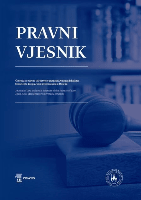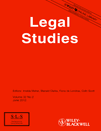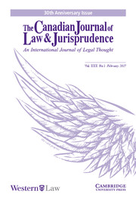
BUFFALO LAW REVIEW
Scope & Guideline
Advancing Legal Discourse and Analysis
Introduction
Aims and Scopes
- Legal Theory and Jurisprudence:
The journal frequently publishes articles that explore foundational legal theories and jurisprudential questions, contributing to an understanding of legal principles and their application in various contexts. - Social Justice and Equity:
There is a consistent focus on themes of social justice, including articles that address racial, gender, and economic disparities within the legal system, advocating for reforms and equitable practices. - Emerging Legal Technologies:
The journal examines the intersection of law and technology, particularly the implications of artificial intelligence, blockchain, and other innovations on legal practices and regulations. - Public Policy and Law Reform:
Many articles propose frameworks for legal reform in response to current societal issues, such as gun violence, environmental law, and healthcare policy, reflecting the journal's engagement with pressing public policy matters. - Historical Perspectives on Law:
The Buffalo Law Review often revisits historical legal cases and doctrines, offering insights into their implications for contemporary legal challenges and the evolution of legal thought.
Trending and Emerging
- Interdisciplinary Approaches to Law:
There is a growing trend towards interdisciplinary research that incorporates insights from sociology, psychology, and technology, enriching legal analysis and addressing complex societal issues. - Environmental Law and Rights:
Recent articles emphasize the need for legal recognition of environmental rights and the implications of climate change, reflecting a heightened awareness of environmental issues within legal scholarship. - Mental Health and Law:
Emerging discussions focus on the intersection of mental health and legal rights, particularly regarding the treatment of individuals within the legal system, indicating a shift towards more humane and informed legal practices. - Reform Movements in Family and Criminal Law:
The journal is increasingly addressing reform movements related to family law and criminal justice, particularly those advocating for restorative justice and alternatives to traditional punitive measures. - Global Perspectives on Law:
An emerging theme involves the exploration of global legal concepts and practices, indicating a trend towards understanding law in a broader, more interconnected context.
Declining or Waning
- Traditional Legal Doctrines:
There seems to be a decline in articles that solely focus on traditional legal doctrines without contemporary relevance, as the journal shifts towards more innovative and interdisciplinary approaches. - Criminal Law and Procedure:
Although criminal law remains a critical area, the frequency of articles addressing procedural aspects or traditional criminal law concepts has diminished, possibly overshadowed by broader discussions on social justice and equity. - Local and State Law Issues:
Discussions centered on local and state law issues have seen a decline, as the journal increasingly addresses national and federal legal frameworks and their implications for broader societal challenges.
Similar Journals

INDIANA LAW JOURNAL
Navigating the Evolving Legal LandscapeINDIANA LAW JOURNAL, a premier publication in the field of law, serves as a vital platform for scholarly discourse and legal scholarship. Established in 1973 and originating from the Indiana University School of Law in Bloomington, this esteemed journal publishes a diverse range of articles, essays, and commentary from both established and emerging legal scholars. With an impressive Scopus Rank of #350 out of 1025 in the Social Sciences domain, placing it in the 65th percentile, the journal is recognized for its contributions to the legal academic community. Its 2023 category quartile ranking of Q2 underscores its significance and relevance, ensuring that published works are widely acknowledged and cited. Although not an open access journal, the INDIANA LAW JOURNAL is committed to fostering robust academic exchanges and enhancing understanding in various legal fields, making it an indispensable resource for researchers, professionals, and students alike. With a history of convergence in publication timelines, it continues to evolve in response to the continually changing legal landscape.

FORDHAM LAW REVIEW
Your Gateway to Cutting-Edge Legal AnalysisFORDHAM LAW REVIEW is a prestigious legal journal published by Fordham University, School of Law, based in the United States. Established to disseminate cutting-edge legal scholarship, this journal has consistently achieved an impactful standing within the field, evidenced by its category ranking as Q1 in Law for 2023 and its Scopus ranking of #428 out of 1025 in the Social Sciences Law category, placing it in the 58th percentile. The journal welcomes submissions across diverse legal topics, fostering discourse that advances both legal theory and practice. Although it does not currently offer open access options, the Fordham Law Review serves as a vital resource for scholars, practitioners, and students seeking insights into contemporary legal challenges and developments. With its rich publication history dating back to the converged years of 1973 through 2024, the journal continues to be a cornerstone for rigorous legal analysis and a platform for influencing the evolution of law.

CALIFORNIA LAW REVIEW
Illuminating Complex Legal Issues with ClarityCalifornia Law Review, published by the University of California, Berkeley School of Law, stands as a premier academic journal in the field of law, boasting a distinguished reputation reflected in its Q1 category rank within the Scopus database, placing it in the 83rd percentile of social sciences law journals. Since its founding, this journal has provided a critical platform for innovative legal scholarship and discourse, drawing upon a rich tapestry of contributions from leading scholars, practitioners, and students. Although not an open-access publication, it offers diverse access options through university libraries and institutional subscriptions, ensuring a wide dissemination of its impactful research. In light of its historical significance and contemporary relevance, California Law Review continues to shape legal thought and practice, fostering a deeper understanding of complex legal issues in the United States and beyond.

Pravni Vjesnik
Navigating the Intersection of Law and Society.Pravni Vjesnik is a peer-reviewed academic journal published by the Pravni Fakultet Sveučilišta Josipa Jurja Strossmayera & Osijek, primarily focusing on the field of law within the social sciences. Since transitioning to an Open Access model in 2016, the journal has broadened its accessibility, allowing researchers, professionals, and students to engage with diverse legal scholarship without subscription barriers. With an ISSN of 0352-5317 and an E-ISSN of 1849-0840, Pravni Vjesnik plays a crucial role in disseminating knowledge and fostering discourse in the legal community, particularly within the context of the Croatian legal system and broader European legal frameworks. Although it holds a rank of #760 out of 1025 in the Scopus database, placing it in the 25th percentile of law journals, its commitment to quality and relevance ensures its importance as a resource for rigorous academic inquiry. The journal's scope is anticipated to expand from 2019 to 2024, promoting ongoing research in contemporary legal issues. This dedication to publishing comprehensive and impactful studies makes Pravni Vjesnik an essential platform for those involved in the legal field.

SYDNEY LAW REVIEW
Exploring the Intersection of Law and SocietySYDNEY LAW REVIEW is a prestigious academic journal published by the Sydney Law School, dedicated to the field of legal studies and interdisciplinary analysis of law and its impact on society. With its ISSN 0082-0512 and E-ISSN 1444-9528, this journal serves as a vital resource for legal scholars, researchers, and practitioners in Australia and globally. The journal has undergone several phases since its inception in 1990, reflecting the evolving landscape of legal scholarship and policy. Although currently not an open-access publication, it remains a significant contributor to legal discourse, maintaining a Q4 ranking in the Law category as per the 2023 category quartiles. The SYDNEY LAW REVIEW encourages submissions that critically explore contemporary legal issues, thereby fostering a robust platform for academic inquiry and professional advancement.

UNIVERSITY OF ILLINOIS LAW REVIEW
Fostering Intellectual Engagement in Legal DiscourseUNIVERSITY OF ILLINOIS LAW REVIEW, published by the esteemed University of Illinois, stands as a pivotal forum for legal scholarship since its inception. With an ISSN of 0276-9948 and an E-ISSN of 1942-9231, this journal serves the legal community by offering rigorous analyses and innovative insights into contemporary legal issues, making it an essential resource for researchers, legal practitioners, and students alike. Although not an open-access journal, it operates within the United States, with contributions stemming from a rich academic tradition. Notably, it holds a respectable Q3 category ranking in Law according to the 2023 category quartiles and ranks 360th out of 1025 in the Scopus Social Sciences Law rankings, placing it in the 64th percentile, affirming its significance in the legal discourse. The journal's scope encompasses a broad range of legal topics, from constitutional law to international legal studies, thus catering to a diverse readership keen on advancing their understanding of the law. In an era marked by evolving legal landscapes, the UNIVERSITY OF ILLINOIS LAW REVIEW remains committed to fostering intellectual engagement and promoting scholarly exchange among all members of the legal field.

Grotiana
Navigating the Rich Tapestry of Legal HistoryGrotiana, a prestigious journal published by BRILL, stands as a vital resource for scholars and professionals engaged in the fields of History and Law. With its ISSN 0167-3831 and E-ISSN 1876-0759, this journal has been a beacon of academic inquiry since its inception, covering a diverse array of topics with an emphasis on legal history and historical jurisprudence. Grotiana holds a commendable impact within the academic community, reflected in its 2023 Scopus ranks indicating a 91st percentile in History and a 67th percentile in Law, underscoring its significance in interdisciplinary studies. Although not an open-access journal, it offers robust access options for institutions and individuals alike, facilitating research and knowledge dissemination. Scholars can benefit from its rich historical insights and rigorous legal analysis, contributing to the ongoing dialogue in these fields. With publishing cycles spanning from 1980 to 2024, Grotiana continues to uphold its commitment to excellence, making it a pivotal player for researchers, students, and professionals pursuing a deeper understanding of historical and legal frameworks.

UNIVERSITY OF TORONTO LAW JOURNAL
Exploring Contemporary Legal ChallengesUNIVERSITY OF TORONTO LAW JOURNAL, published by University of Toronto Press Inc, stands as a distinguished platform in the realm of legal scholarship, having served the academic community since its inception. With an ISSN of 0042-0220 and an E-ISSN of 1710-1174, this quarterly journal is not only recognized for its rigorous peer-review process but also boasts an impressive Q2 rank in Law and a Q3 rank in Sociology and Political Science as per the 2023 category quartiles. The journal aims to foster advanced knowledge and discourse on various legal issues, thereby appealing to researchers, professionals, and students alike who are eager to engage with contemporary legal debates. It is noteworthy that the journal currently does not offer open access, ensuring the integrity and quality of its publications for a subscribed audience. Published in Canada and available for a wide readership, the UNIVERSITY OF TORONTO LAW JOURNAL continues to be a pivotal source for critical analyses and fresh insights in the fields of law and social sciences, contributing significantly to the understanding and evolution of legal frameworks.

Legal Studies
Engaging Minds, Influencing LawLegal Studies, published by Cambridge University Press, is a leading journal in the field of law, recognized for its commitment to advancing scholarly dialogue and critical analysis of legal issues. With an ISSN of 0261-3875 and an E-ISSN of 1748-121X, this prestigious journal has been a key resource for researchers, practitioners, and students since its inception in 1981, and it continues to serve the academic community through rigorous peer-reviewed research up to 2024. Positioned in the Q2 category of law journals and ranked within the 60th percentile among social sciences law publications in Scopus, Legal Studies offers a unique platform for innovative legal scholarship, exploring contemporary legal phenomena and their societal implications. Although not an open-access journal, it provides subscribers and institutional partners with exclusive access to high-quality articles that inform legal thought and practice. The journal’s aim is to foster interdisciplinary perspectives and to challenge traditional viewpoints, making it an indispensable tool for anyone engaged in the legal field.

Canadian Journal of Law and Jurisprudence
Bridging Historical Context with Contemporary ChallengesCanadian Journal of Law and Jurisprudence, published by Cambridge University Press, serves as a pivotal platform in the field of legal studies, particularly recognized for its comprehensive exploration of jurisprudence in the context of Canadian law. While the journal operates without an open access model, its ISSN 0841-8209 and E-ISSN 2056-4260 ensure broad academic accessibility. Based in the United Kingdom, it has established a notable impact within its category, maintaining a Q3 ranking in Law according to the latest 2023 metrics. With its convergence of issues from 1996 to 2003, periods in 2007, and recently from 2012 to 2024, the journal embraces a rich historical context while addressing contemporary legal challenges. Ranked #439 out of 1025 in the social sciences category on Scopus, the journal is positioned within the 57th percentile, highlighting its significance and influence in legal scholarship. Aimed at researchers, professionals, and students, the Canadian Journal of Law and Jurisprudence is an essential resource for those seeking to deepen their understanding of the evolving landscape of law and its philosophical underpinnings.